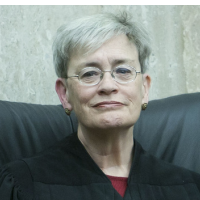Presiding Judge of the Foreign Intelligence Surveillance Court: Who Is Rosemary Collyer?
 Rosemary Collyer
Rosemary Collyer
Rosemary Mayers Collyer, a senior U.S. district judge for the District of Columbia, was appointed by the Chief Justice of the United States John Roberts to a seven-year term on the Foreign Intelligence Surveillance Court (FISC). Her service on the secretive judicial body commenced on March 8, 2013.
Collyer was born in Port Chester, New York, on November 19, 1945. She attended Trinity College, earning her B.A. degree in 1968. The following year she was hired as a reporter for the Canadian Register in Toronto, Canada, and in 1971 she became director of public relations of the Manlius Pebble Hill School in Manlius, New York. In 1972 she joined Pennington & Richard Associates as its creative director, then moved the next year to Personnel Predictions & Research as an instructor. After that, it was back to school, attending the University of Denver College of Law, where she earned a J.D. in 1977.
That year, Collyer joined the Denver, Colorado, law firm of Sherman & Howard as a labor attorney. She was also a precinct committeewoman for the Republican Party. She left private practice in 1981 when President Ronald Reagan appointed her to serve as chairman of the Federal Mine Safety and Health Review Commission, a post she held until 1984. She next joined the National Labor Relations Board as their general counsel, where she stayed for five years. In 1989, she returned to private law practice as a partner at the Washington firm of Crowell & Moring.
On August 1, 2002, Collyer was nominated by President George W. Bush to a seat on the U.S. District Court for the District of Columbia, and was confirmed by the U.S. Senate on November 14, 2002.
During the course of her tenure, Collyer has ruled on a number of notable, even controversial, cases. Among them was an opinion she rendered in February 2011 in which she limited the release of details of the George W. Bush administration’s memos regarding torture. In September 2011, she supported the Central Intelligence Agency’s contention that for it to even acknowledge its interest in using drones for targeted killing would result in serious damage to U.S. national security. On March 15, 2013—only a week after her appointment to the secret FISC—Collyer’s decision in that case was unanimously reversed by the D.C. District Court of Appeals, which ruled that the CIA was adhering to “a fiction of deniability that no reasonable person would regard as plausible.” The settled case—American Civil Liberties Union v. Central Intelligence Agency (pdf)—was then sent back to Collyer for processing. In June 2015, she again supported the CIA’s legal right to secrecy.
In the wake of a ruling by another federal judge that the NSA phone call records collection program was probably illegal, Collyer, in March 2014, ruled against Verizon’s legal challenge to the program, claiming that people have no expectation of privacy when making phone calls.
In November 2015, Collyer’s colleague, Judge Richard J. Leon of the District Court for the District of Columbia, ordered the NSA to stop collecting phone records on a Verizon customer and his firm, thereby partially blocking the program, which he claimed was likely unconstitutional.
In May 2016, Collyer handed Republican lawmakers a victory in their campaign against the Affordable Care Act when she ruled that a key part of the law lacked funding authorization from Congress. She stayed her decision pending an appeal.
Another ruling by Collyer landed in the midst of the controversial 2016 U.S. presidential campaign, as she rejected claims by the Libertarian and Green parties that they had a legal right to participate in that year’s presidential debates with Hillary Clinton and Donald Trump. The two minor political parties’ “alleged injuries are wholly speculative and are dependent entirely on media coverage decisions,” she said. “The alleged injuries—failure to receive media coverage and to garner votes, federal matching funds, and campaign contributions—were caused by the lack of popular support of the candidates and their parties sufficient to attract media attention.”
In other decisions, Collyer, in 2010, ruled for public transparency in a case involving secrecy of taxpayer-funded private jet flights; in 2013, joined colleagues in ruling against a Texas voter ID law; and that same year ruled in favor of Obama administration reporting requirements for assault rifle sales along the U.S.-Mexican border.
In 2016, Collyer was named chief judge of the Alien Terrorist Removal Court, which is tasked with determining whether non-citizens should be deported from the U.S. on the grounds that they are terrorists. That same year, on May 19—three years after her appointment to the Foreign Intelligence Surveillance Court—Collyer replaced Thomas Hogan as its presiding judge. Her term will end on March 7, 2020.
Collyer is married to Philip Collyer, a self-described nonprofit entrepreneur. They have an adult son, Tim.
-Danny Biederman
To Learn More:
Once Again, Libertarian and Green Parties are Denied Participation in Presidential Debates (by Kevin Lessmiller, Courthouse News Service)
Bush-Appointed Judge Sides with Republican Lawmakers in Ruling against Health Law Subsidies (by Bob Bouboushian, Courthouse News Service)
Rosemary Collyer’s Worst FISA Decision (by Marcy Wheeler, Emptywheel)
Foreign Intelligence Surveillance Court Rejects Verizon’s Challenge to Constitutionality of NSA Collection of Call Records (by Steve Straehley, AllGov)
Obama Justice Dept. Claims Courts have no Right to Challenge Government Killing of Americans Abroad (by Matt Bewig, AllGov)
- Top Stories
- Unusual News
- Where is the Money Going?
- Controversies
- U.S. and the World
- Appointments and Resignations
- Latest News
- Trump Orders ICE and Border Patrol to Kill More Protestors
- Trump Renames National Football League National Trump League
- Trump to Stop Deportations If…
- Trump Denounces World Series
- What If China Invaded the United States?






Comments